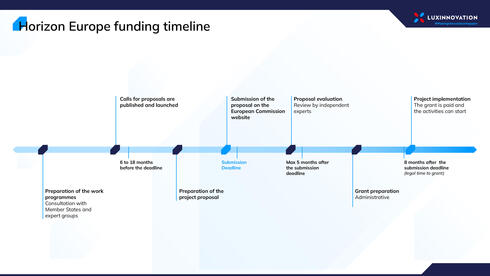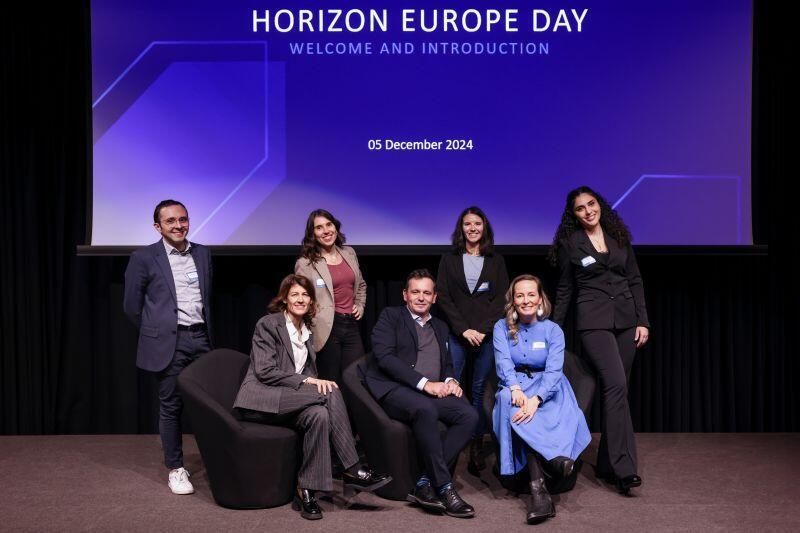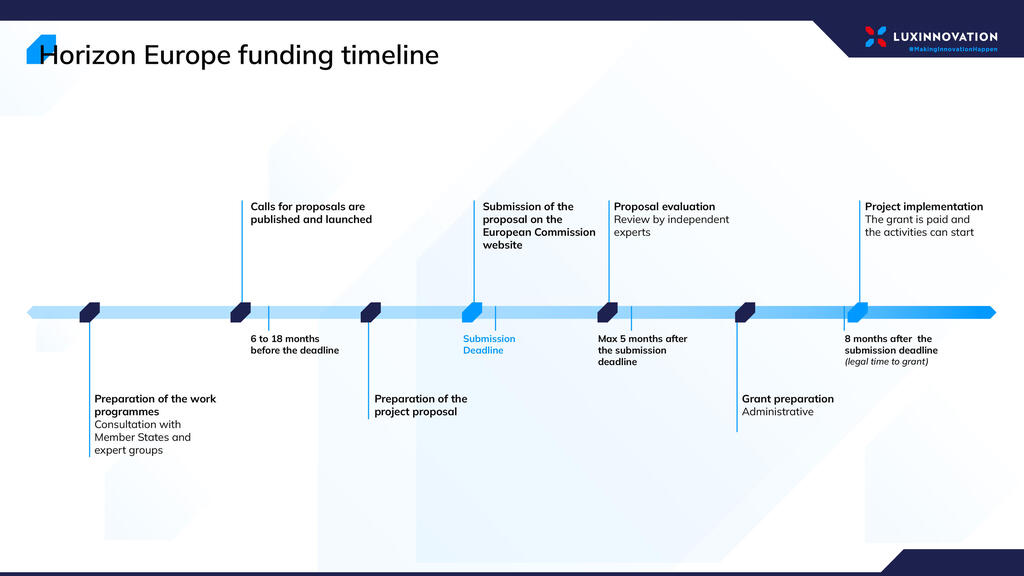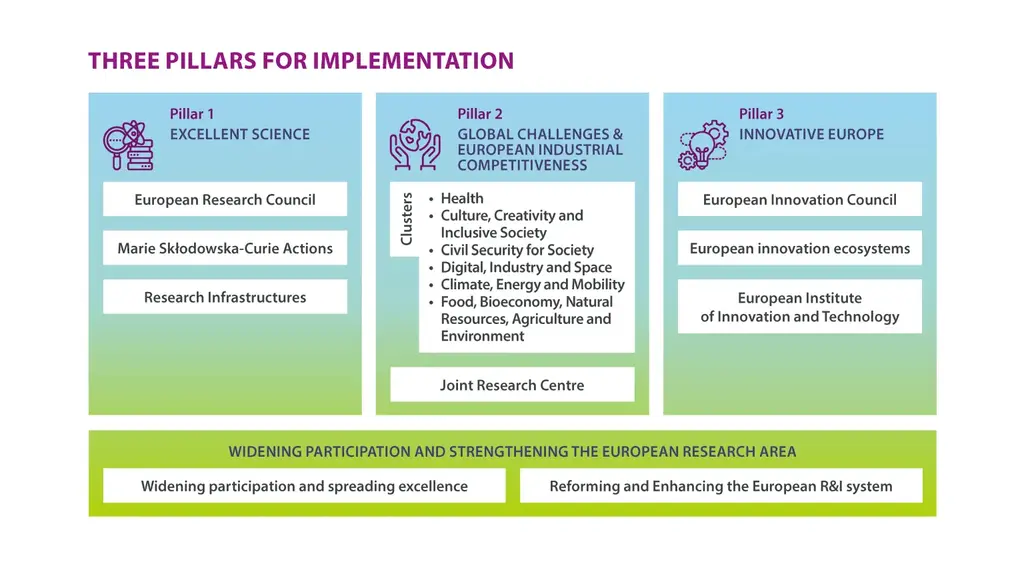
Israel and Luxembourg: a winning partnership for Horizon Europe
Israel and the European Union have a long history of collaboration in research and innovation. As an associated country, Israel has been part of the EU’s R&I framework programs since 1996 — with impressive results. To date, the EU has funded 2,403 projects involving Israeli companies and research organizations. By partnering with Luxembourg companies and research organizations, which have a historically high success rate in securing EU funds, Israeli participants can fast-track their entry into European projects, networks, and markets
(What is Horizon Europe? Video: ISERD)
In 2021, the European Union launched Horizon Europe, its main funding program for research and innovation, which is a continuation of the previous Horizon 2020. The program is backed by a substantial budget: a total of €95.5 billion for the period 2021-2027. Of these, over €1.1 billion has been awarded to Israeli researchers and companies since 2021. Top participants include the Weizmann Institute of Science, Tel Aviv University, and The Hebrew University of Jerusalem, as well as companies such as TripleW and Arteevo Technologies.
As an associated country with Horizon Europe, any company or research organization from Israel can apply for funding under the scheme. In addition to dedicated funding, the framework provides access to a vast network of European R&I partners and know-how, which can support expansion into Europe. Horizon Europe covers six thematic clusters, including key sectors such as Mobility, Energy, Climate, Digital, Space, and Health, among others.
“The innovation ecosystem of Israel is a source of inspiration for Europeans,” says Dr. Gediminas Ramanauskas, First Counsellor and Head of Research and Innovation Section at the Delegation of the European Union to Israel. “The EU can take advantage of Israel’s leading position in high-tech innovation, commercialization of scientific discoveries, and experience in start-up creation and nurturing unicorns,” he adds.
Benefiting from Luxembourg’s expertise in Horizon Europe
Most calls for proposals within Horizon Europe require companies, universities, and research organizations to apply in a consortium that includes at least three partners from different EU or associated countries, with at least one of them being an EU country. Among these, Luxembourg stands out: the country boasts a success rate of 18.53% in Horizon Europe applications, with Luxembourg participants receiving a total of over €200 million over the last three years (2021-2024).
Compared to larger EU countries, Luxembourg’s small size is a significant advantage. The country fosters participation in Horizon Europe projects by supporting applicants through its national innovation agency, Luxinnovation. “Here in Luxembourg, we are able to give more personalized support to applicants,” says Sanna Alaranta, European R&D and Innovation Advisor at Luxinnovation. “Through them, our support benefits the whole consortium. We are also proactively reaching out to companies and organizations to identify potential candidates at a national level,” she adds.
“Since the start of the Horizon Europe program, Israel and Luxembourg have jointly participated in 27 projects, with a combined EU contribution of over €810 million,” says Shlomi Kofman, Managing Director of Israel-Europe Research Directorate (ISERD). “These projects highlight the mutual interest in leveraging each other’s strengths to tackle global challenges,” he adds. ISERD, which operates through the Israel Innovation Authority, serves as Israel’s pivotal gateway to Horizon Europe programs by providing expert guidance throughout the proposal submission process, and offering “Red Team” professional reviews by Israel Innovation Authority specialists to elevate proposal quality. Additionally, ISERD offers a unique program that provides financial reimbursement for proposal preparation expenses. What’s more, “this collaboration is not only enriching for the participants — it also contributes to building a more resilient and innovative Europe–Israel innovation landscape,” says Kofman.
Significantly, in Luxembourg “the biggest share of funds from Horizon Europe goes to private organizations,” says Alaranta. However, also the national research organisations have become more successful and experienced. The expertise of the more experienced trickles down, “increasing the overall readiness level of players in the country,” she adds. This readiness benefits all the prospective partners that wish to access Horizon Europe funding, increasing their chances of success. Additionally, Luxinnovation offers support from sectoral experts with deep technical knowledge of the local ecosystem. These experts can help foreign companies identify ideal partners for specific projects and gain access to local pilots and demonstrators.
3 View gallery


Sanna Alaranta, Senior Advisor - European R&D and Innovation Support at Luxinnovation (first row, first from the right)
(Photo: Luxinnovation)
Three Israeli success stories — and how to become one
The Horizon Europe funding that Israeli researchers and companies have received “is a powerful testament to the strength and innovation of the Israeli ecosystem,” explains Kofman. “605 researchers secured nearly €592 million, 386 companies were granted €228 million, and 40 SMEs received almost €95 million,” he adds. A large portion of this funding — €110 million — was awarded in the domains of mobility and energy, core pillars of the EU Green Deal.
Over the years, these Horizon Europe projects have generated notable success stories among Israeli companies. For instance:
• GenCell is part of WeForming, a project paving the way for smart, energy-efficient buildings that actively participate in flexible energy markets. The project includes four partners from Luxembourg.
• Ecosense Group and Variance Ascola are involved in Healthy Ships 4 U, a project reimagining health and safety systems onboard large passenger ships. The consortium includes Luxembourg’s Netcompany-Intrasoft.
• Flyvercity, a startup providing traffic management services to enable drone operations, is a partner in SAFIR-Ready, a project developing a full ecosystem for drone-based critical missions, including medical deliveries. Luxembourg’s Luxmobility is a partner in the project.
To help more Israeli companies become success stories, EIT Hub Israel — a global outreach location of the European Institute of Innovation and Technology (EIT), a body of the European Union — launched the Bridging the Horizon program in 2021. The initiative aims to strengthen scientific and technological collaboration between Europe and Israel. EIT Hub Israel supports Israeli startups, research institutions, and corporates through consortium-building activities and draws on the broader EIT ecosystem — the largest innovation network in Europe — to connect Israeli innovators with like-minded European partners through curated matchmaking roundtables.
“To strengthen Europe’s global leadership in innovation, we must tap into the world’s most advanced technologies, talent, and ecosystems. Israeli tech brings agility, and breakthrough solutions that complement Europe’s strengths,” says Eden Dvir Zano, Managing Director of the European Institute of Innovation and Technology (EIT) Hub Israel.
Supporting future partnerships in Horizon Europe is a goal that EIT Hub Israel shares with ISERD and Luxembourg Trade & Invest, the co-organizers of the next Bridging the Horizon roundtable, dedicated to Smart & Safe Mobility. This upcoming matchmaking event presents an opportunity for companies and research organizations to explore collaborations with funding of up to €5 million to drive innovation in safer and more sustainable transportation. This topic is very timely in Luxembourg, where the government recently unveiled the new AutoMobility Incubator, led by Israeli Manager Erez Arye, to foster mobility innovation.
Are you a mobility company looking to meet potential consortium-building partners? The next Bridging the Horizon virtual roundtable, dedicated to Smart & Safe Mobility, will take place on 27 May 2025. Apply now for a chance to participate.
If you want to learn about Luxembourg as your launch pad to Europe and our tailor-made support, please feel free to contact the Luxembourg Trade & Investment Office in Tel Aviv for further information.
First published: 13:52, 27.04.25














